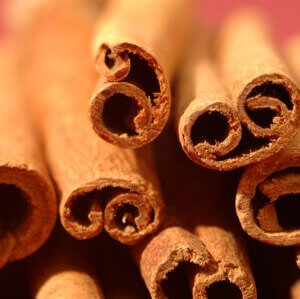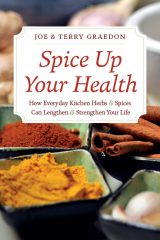
We often warn patients to be aware of potential interactions among the different medicines they take. That is just as important for those taking dietary supplements. Unfortunately, it can be far more difficult to learn about interactions between drugs and supplements. One reader had a relevant question about interactions between cinnamon and medications:
Does Cinnamon Interact with Coumadin?
Q. My husband takes Coumadin (warfarin) for atrial fibrillation. We recently began taking a mixture of honey and cinnamon. Does cinnamon interact with Coumadin?
He also has hypertension and takes medication for that. Does he need to discuss this with his doctor? We don’t want to create a problem by taking the honey and cinnamon mixture.
A. Cinnamon has become very popular for its medicinal properties. People with type 2 diabetes may use it to help control blood sugar (Annals of Family Medicine, Sept/Oct, 2013; Endotext, March 4, 2014). Cinnamon might also help normalize cholesterol levels and reduce joint inflammation.
Coumarin as a Possible Problem:
The trouble is that the most common form in the supermarket is cassia cinnamon, which often contains a compound called coumarin. (Although it sounds like Coumadin, it isn’t at all the same compound.) Some people are susceptible to liver damage if they take too much of this spice.
Coumarin affects drug metabolizing enzymes CYP 2D6 and 3A4. As a result, it might theoretically interact with the anticoagulant warfarin as well as with a number of blood pressure medications. Certain drugs such as amlodipine, diltiazem, felodipine isradipine, nicardipine and nifedipine might be affected because they are metabolized through CYP 3A4. CYP 2D6 is critical for metabolizing the blood pressure medicine metoprolol.
Other Possible Interactions:
Another compound found in cinnamon is cinnamaldehyde. This agent inhibits the enzyme CYP 2A6 and consequently can interfere with the metabolism of nicotine (Drug Metabolism & Disposition, April 2016). We trust, however, that your husband is not smoking cigarettes or chewing nicotine gum.
We don’t have any studies that show whether there truly are interactions between cinnamon and medications metabolized by these enzymes. The reactions may be purely theoretical.
Your husband should ask his doctor to check whether cinnamon would pose a problem with his other drugs. The doctor may need to consult a reference to find out if the medications he has prescribed are metabolized by CYP 2A6, 2D6 or 3A4.
Revised 1/26/2017



Ray
Virginia
Concerning the interaction of cinnamon and anti-coagulants such as Warfarin and Coumadin. I take Plavix. Should I be concerned also?
Wayne
Indiana
How much Coumarin is safe? I have been useing an infusion because I thought it was safe and there is a water exttract sold under the trademark “Cinnulin PF” but now I see a sulubility for Coumarin in water of 1.7 g/l.
Jim H
WI
There are various types of cinnamon. Ceylon isthe true variety.
Have they all been found to have the same interaction?
Terry Graedon
No. Much of the information is on coumarin, which is barely detectable or not found at all in Ceylon cinnamon but present in variable amounts in cassia cinnamon.
Lee
Virginia
I would ask my pharmacist, (s)he has more drug knowledge, more information at fingertips and more time, in many cases. From that conversation, talk to my doctor.
nancy crain
voorhees, new jersey
I work daily with pt on coumadin . Sometimes it takes me a while to figure out what they are taking that may be interferring with the coumadin. this is very interesting and helpful to me.
BAP
I am the former head of a university Coumadin clinic.
1 – anticoagulant is more accurate then blood thinner
2 – I use term blood thinner all the time, because that is what many patients feel comfortable with
3 – Coumarin type compounds were what Coumadin was synthesized from back in the 40’s
4 – The interaction with Coumadin should be constant if the amount is constant and should be reflected in the INR, however different cinnamons have different amounts that may also vary lot by lot.
5 – I have several patients on cinnamon and Coumadin – I will make them aware of the possible interaction and may recommend more frequent testing.
6 – Many medications were derived from plant sources, however plant sources can be quite variable in potency and the shelf life can be short.
7 – until the 1960’s, digitalis leaf was the main form of digoxin/digitalis and was dosed by the leaf. Patients were advised to increased their dose biweekly until they got sick and decreased it back to the prior dose. Not a very safe way to do things.
Eat well, exercise well, love well, and live well.
BP
JB
My Cinnamon caps from the Health Food store contain Cinnamomum aromaticum & cinnamomum verum (bark)w/min 16 mg cinnamaldehyde. Anyone know if this has the coumarin in it? I take 1 a day with meal.
J.L.
wbt, most of us who are on anticoagulants, as you so rightly refer to Coumadin, know the correct terminology. We use the vernacular because it’s easier to do so, and more people understand “blood thinner” than “anticoagulant.” And besides, it’s easier to spell (joke). Blood thinner, anticoagulant; not the same thing, but in the context we are using here, most can get the message. For those who may not know, anticoagulants slow or inhibit clotting of blood.
wbt
Coumadin is NOT a “blood thinner” but is an anticoagulant.
Joe
Is Eliquis an anti-coagulant. Or a thinner for blood?
DrMikey
A recent article describes the two types of cinnamon and suggests the “right” one:
https://www.peoplespharmacy.com/2013/12/30/cinnamon-offers-health-benefits-but-also-carries-serious-risks/
J.L.
It is my understanding that Saigon cinnamon and Ceylon cinnamon are both coumarin-free. Both are labeled as such on the bottle. If there is no specification on the label it is probably cassia cinnamon. I am on Coumadin and don’t want to add blood thinners to my diet. I use Ceylon cinnamon. Research the above named cinnamons to be sure you are getting correct information.
People’s Pharmacy response: Ceylon cinnamon is the correct choice for you. It does not have significant coumarin. Saigon cinnamon is cassia cinnamon, and might have some coumarin.
paul43
How do you find the right type of cinnamon?
Deb
This news re: more than one type cinnamon is SHOCKING! Since many of us have started taking it regularly for the prevention of diabetes/insulin health, with absolute no prior knowledge that there was more than one type.
This word needs to be spread far and wide. After checking a couple of brands I have here at home, there is no info about what type cinnamon I’ve bought!